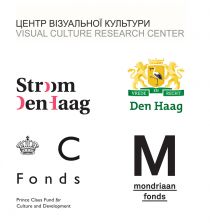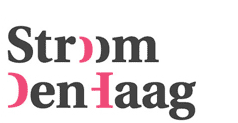From Crimea to Siberia: How Russia is Tormenting Political Prisoners Sentsov and Kolchenko
Wednesday 27 March 2019, 19:00 hrs
Location: Stroom, Hogewal 1-9, The Hague
Admission: free
Language spoken: English
This evening is part of Hybrid Peace by Visual Culture Research Center (Kyiv, Ukraine).
Screening and talk by Angelina Kariakina (Ukraine), editor-in-chief of Hromadske TV.
On May 10, 2014, both Ukrainian filmmaker Oleg Sentsov and activist Oleksandr Kolchenko were detained in occupied Crimea. They were accused of plotting terrorist acts, taken to Russia and convicted. Kolchenko was sentenced to 10 years in prison and Sentsov to 20 years. Two other Ukrainians - Gennadiy Afanasiev and Oleksiy Chirniy - were arrested with Sentsov and Kolchenko. Afanasiev was released in a 2016 prisoner exchange, and Chirniy is still held in a penal colony in Magadan.
Four years after his arrest and thousands of kilometers away from his initial place of detention, Sentsov announced a hunger strike on May 16, 2018. His sole condition for its end is the release of all Ukrainian political prisoners located on the territory of the Russian Federation. Together with the ones that are held in Russia-occupied Crimea, there are 64 of such political prisoners. Sentsov and Kolchenko were first held in a detention center in Moscow, tried in Rostov, transported to the Urals and then to the Russian Arctic. Between the two of them, they have covered almost 20,000 kilometers, equivalent to half the distance around the Earth. Their entire journey has been within Russia. Or more accurately - within its prison system.
The journalists of Hromadske TV traveled to the key sites along their transport route - where the Ukrainian consuls were denied access and where lawyers today face difficulties getting in - to find out in what conditions they are being kept and who is ultimately responsible for their fate.
Angelina Kariakina is an editor-in-chief of Hromadske TV. She worked as a correspondent and editor with printed media and TV, covered Maidan protests, Russian aggression and conflict in Eastern Ukraine, Sentsov and Kolchenko trial in Russia, refugee crisis in Hungary. In 2016, she started an investigative documentary series Traces of Revolution with a fellow journalist Anastasia Stanko and graduated from Sergei Bukovski Documentary School. She was also a participant at The School of Image and Evidence, Kyiv Biennial 2015, GFZK Leipzig exhibition Sentsov's Camera, 2016, and a guest fellow at the Institute for Human Sciences in Vienna, 2017.
ACKNOWLEDGEMENTS
Hybrid Peace is made possible through the generous support of: Mondriaan Fund, The City of The Hague, Prince Claus Fund for Culture and Development.
- Wednesday 27 Mar '19 19:00 hrs
- Stroom Den Haag, Hogewal 1-9, The Hague
- Entrance: free
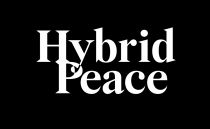
Hybrid Peace emblem by Uliana Bychenkova, animation by Oleksiy Romanenko (Ukraine)
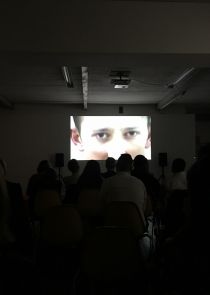
'From Crimea to Siberia' at Stroom, 27 March 2019
photo: Stroom Den Haag
photo: Stroom Den Haag
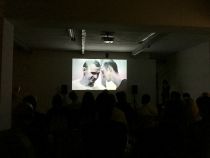
'From Crimea to Siberia' at Stroom, 27 March 2019
photo: Stroom Den Haag
photo: Stroom Den Haag
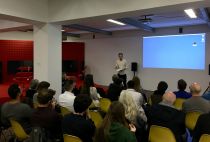
'From Crimea to Siberia' at Stroom, 27 March 2019
photo: Stroom Den Haag
photo: Stroom Den Haag
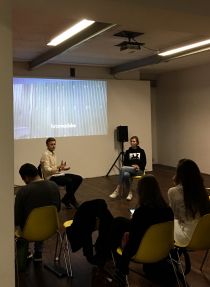
'From Crimea to Siberia' at Stroom, 27 March 2019
photo: Stroom Den Haag
photo: Stroom Den Haag
